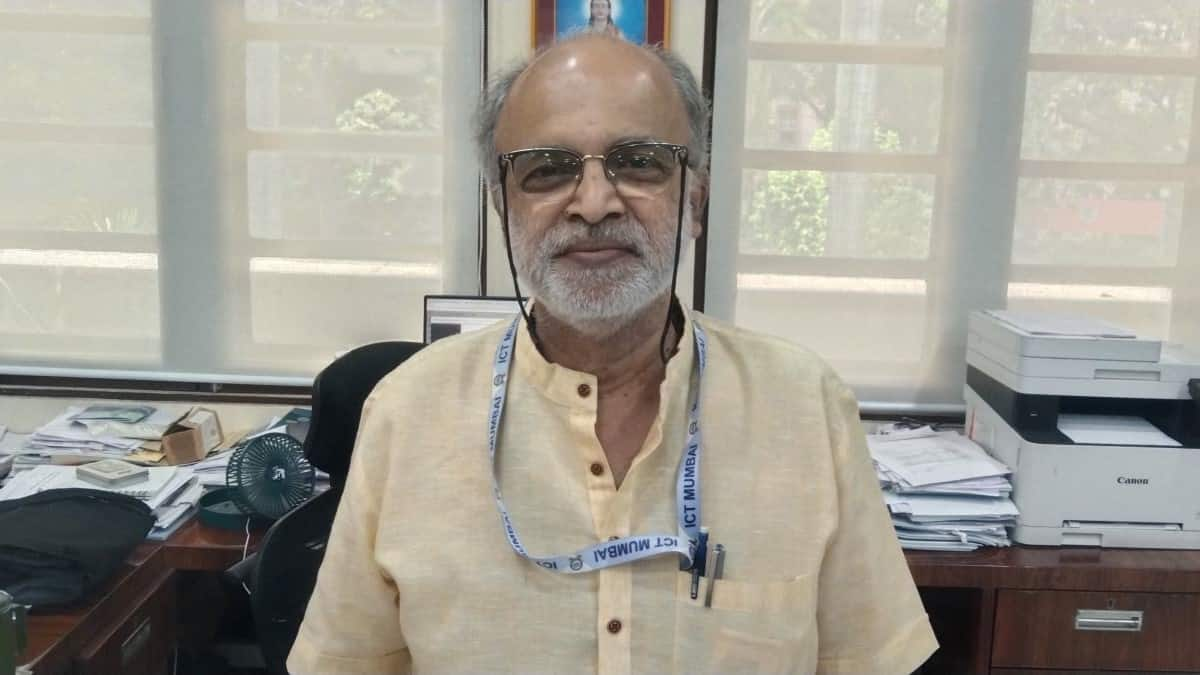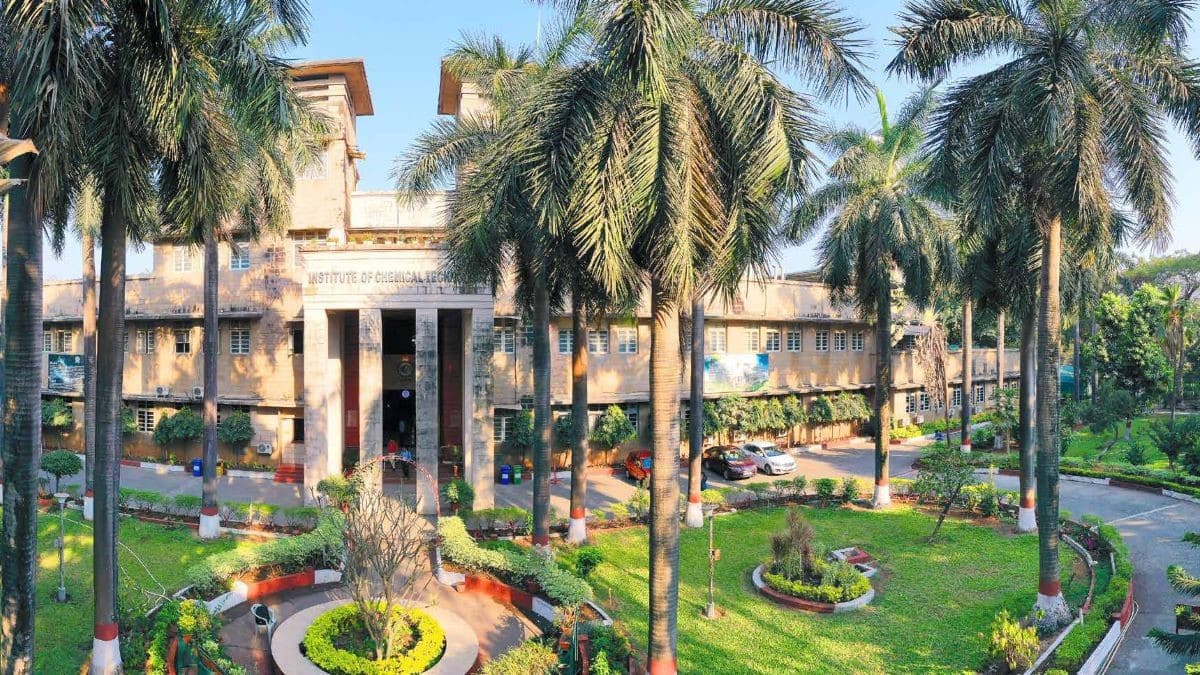‘All core engineering branches are seeing a revival’: ICT Mumbai VC
Musab Qazi | April 22, 2025 | 12:25 PM IST | 7 mins read
Resurgence in manufacturing holds hope for core engineering, says Institute of Chemical Technology VC. ICT has launched 13 BTech minor degrees, new departments, and an MBA.

MUMBAI: Established as the University Department of Chemical Technology (UDCT) under University of Mumbai in 1933, the Institute of Chemical Technology (ICT Mumbai) has transformed into a public deemed university, known for research in chemical engineering and allied fields. In this interaction, ICT vice-chancellor Aniruddha Pandit talks about the institute’s new courses, revival of core engineering streams and research funding. Edited excerpts:
What are some of ICT’s new academic initiatives?
We implemented the National Education Policy (NEP) at the postgraduate (PG) level in 2022 and for undergraduate (UG) programmes in 2023. Since then, we have made a couple of revolutionary decisions as we had access to multiple science areas, including chemical engineering, and seven specialisations in chemical technology – food engineering; oils oleochemicals and surfactants; polymer engineering; surface coating; fibres and textile processing; pharmaceutical chemistry; and dyestuff technology. We recently started a department of biological sciences and biotechnology.
We have also introduced 13 multidisciplinary minors (MDMs) for UG students to have access to knowledge beyond their own stream and get a minor degree.
Last year, we started an MBA in innovation and entrepreneurship in collaboration with the Tata Institute of Social Sciences (TISS) and Jamnalal Bajaj Institute of Management Studies (JBIMS). The course is taught by teachers from the two institutes as well as our in-house faculty and some alumni. Its focus is social entrepreneurship.
The course is a progression from the existing postgraduate diploma in chemical technology management (PGD-CTM) available to our PhD scholars. It acquaints students with management practices related to chemical technology for a possible entrepreneurial future. The admission criteria and fees are the same as JBIMS’s MBA programme. The All India Council for Technical Education (AICTE) had sanctioned 18 seats for the first batch, of which we could fill 15.
Did the institute have the requisite expertise and faculty to teach new subjects?
We’ve always had the supporting departments of physics, mathematics and general chemistry. Even earlier, students had a few courses related to other branches of engineering, such as mechanical, civil and electrical. Now they are also expected to specialise in them.
We set up the management and humanities department for NEP rollout.
Also read ‘VJTI helped set up IIT Bombay; want to become standalone tech university like COEP’: Director
What else is ICT doing to promote entrepreneurship and integrate it with the curriculum?
The UG students are taught a course on chemical project economics, which, though not specifically about entrepreneurship, makes them aware of all the activities related to chemical technology management.
We also have a business incubator since 2021, ICT NICE, which receives grants from the Department of Science and Technology (DST). It’s a section 8 (non-profit) company, which guides aspirants. It’s currently incubating 18 start-ups by ICT students, alumni and staff. We will gradually open it up for others as well.
Do you see more engineering graduates taking up entrepreneurship?
There’s a definite trend towards self-employment. However, unlike IT, where a business can be started with minimal investment, chemical technology projects need large capital. Hence, the growth is more gradual.
How are you able to manage workload after adding minors to the curricula?
It’s a task but we have to do it as it’s part of NEP. Some existing courses had to be sacrificed to accommodate new subjects. The number of credits and workload increased but the faculty and students are enjoying it.
Some of the older faculty members were reluctant, but that’s expected. Younger ones, who are keen to prove themselves, are more enthusiastic.
We had already been doing many of the activities prescribed under NEP. They have now just been formalised.
Is ICT Mumbai making changes in pedagogy or the assessment system?
A lot. It’s more of a project-based learning now. The focus is now on teaching the application of available information. Students are expected to do pre-lecture readings as access to information is now easier, while the classroom instructions are geared towards developing products through this information. This is what keeps students interested and makes them want to attend lectures.
What does the future hold for core engineering branches considering how they fell out of favour in the last decade?
I think all core branches are undergoing a second revival.
People have realised that all service branches will come to a standstill unless there’s improvement in manufacturing. How long will financial jugglery sustain the service sector?
Earlier, manufacturing contributed more to the country’s Gross Domestic Product (GDP) than the services. However, the proportions were reversed due to growth in the service industry while manufacturing stagnated.
Now we see a resurgence in production, but not in a conventional way. There’s a lot of automation, reducing the dependence on humans, though it’s not as common in India as the rest of the world. Even agricultural universities have started collaborating with core disciplines, resulting in automated farming, breeding of new seed varieties and better produce.
Also read COEP Pune will ‘double’ BTech Computer Science, Electrical Engineering seats: VC
Do you think engineering colleges, especially the smaller standalone institutes catering to the bulk of the students, can keep up with these changes?
They are trying. We have been mentoring some of the smaller institutes, so that their students could benefit from the ICT tag. We have tied up with all the colleges in Mumbai that offer the chemical engineering course, as well as a few other universities.
Their faculty attend our faculty-development programmes. We conduct between 14 and 20 of these activities annually, partly due to a mandate from the Maharashtra State Faculty Development Academy (MSFDA).
The only way engineering colleges can implement NEP is if they have a critical mass. While they need to be mentored, they should also come out of their shell and seek help.
What regulatory interventions are needed to ensure effective NEP alignment?
The availability of engineering books in the local languages is of foremost importance. This initiative will go a long way in improving students’ understanding of science and engineering.
But don’t employers place a premium on the knowledge of English?
That’s not true. It really depends on the nature of the job and industry to which they are applying. The bulk of the communication in the production industry still happens in the vernacular.
Why did this initiative fail to take off in several states?
It’s because it was done half-heartedly. The state governments created confusion among students. They should keep politics aside.
The interesting thing about the Marathi-language engineering books produced so far is that they have retained the common English terminologies.
Do you think the state government should also step up its education funding?
Yes. The only funding for research from the state is through Rajiv Gandhi Science and Technology Commission (RGSTC). There are fellowships for marginalised students, but one needs resources to purchase materials and equipment. Why can’t the state have all its departments set aside a small proportion of their budget for research in their respective areas?
The centre has been emphasising on institutes generating their own resources through private players, especially for the phase when technology transitions from research to deployment (the ‘valley of death’).
We are already doing it. However, the private industry in India is also yet to get into the habit of supporting long-term projects, as is done by the government.
At any given moment, ICT is providing consultation for 100 projects, around 30-40% of them from the government while the rest are from private industries. But the proportion of compensation we get is the reverse.
The state has now allocated 27 acres of land at Khidkali [in Thane district] to set up a Centre for Translational Research, where we will work on three areas - chemical engineering and technology, energy engineering and technology, and environmental engineering and technology. We will work in collaboration with the industry to tide over the valley of death. We plan to run short-term courses for the faculty to train people in managing projects at the centre.
 ICT was established as the University Department of Chemical Technology (UDCT) under University of Mumbai in 1933. (Image: ICT Mumbai)
ICT was established as the University Department of Chemical Technology (UDCT) under University of Mumbai in 1933. (Image: ICT Mumbai)
FAQs
Q1. What is ICT Mumbai famous for?
Once a department of the University of Mumbai, Institute of Chemical Technology has made a mark in the field of chemical engineering. New technologies developed by it have been scaled up and used in sectors as diverse as petroleum, food processing, and waste management, and granted patents in India and abroad.
Q2. What are the fees of ICT Mumbai?
The fees for four-year BTech and B.Pharma at ICT Mumbai is Rs 7.20 lakh while that of MTech ranges from Rs 1.80 lakh to Rs 3.89 lakh
Q3. What is the highest package in ICT Mumbai?
According to the data submitted for the NIRF 2025 ranking, the median salary for the four-year BTech batch that graduated last year was Rs 9 lakh per annum.
Q4. Is ICT Mumbai worth joining?
ICT Mumbai is generally considered one of the best institutes for BTech in chemical engineering. It had secured NIRF Rank 41 for engineering last year, and according to the data submitted for NIRF 2025, 127 out of a total 264 students graduating last year were placed.
Follow us for the latest education news on colleges and universities, admission, courses, exams, research, education policies, study abroad and more..
To get in touch, write to us at news@careers360.com.